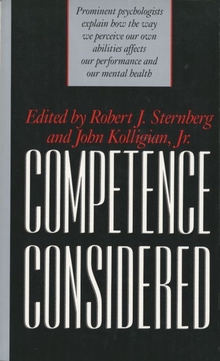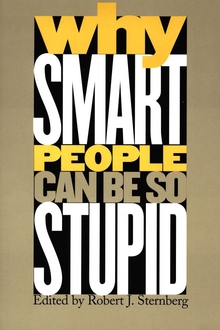Competence Considered
WARNING
You are viewing an older version of the Yalebooks website. Please visit out new website with more updated information and a better user experience: https://www.yalebooks.com
Edited by and Robert Sternberg
In this fascinating book, a distinguished group of psychologists presents the latest research on competence and incompetence—real and perceived—from childhood through adulthood. This book brings the insights of social and personality psychology to bear on questions of intelligence; it is also distinctive in showing how the way we perceive our own abilities affects our performances and our mental health.
"Well-organized, the book moves smoothly from developmental to social to clinical perspectives. Its preface provides an excellent preview of the work to come, and the final chapter is a delightful summary and commentary, raising further questions, and suggesting alternative explanations or methods of exploration."—Charlotte Ellinwood, Readings: A Journal of Reviews and Commentary in Mental Health
"This book will be influential. . . . [The] chapters are well written and often thought provoking. . . . [Its] orientation is enriched by researchers who emerged from different schools of thought such as Sidney Blatt, David Elkin, and John Nicholls. Albert Bandura's overview alone will make this book important."—Choice
"An indispensable book for theorists and researchers in a variety of domains. It contains a magnitude of significant and interesting findings that represent a promising basis for future research."—Ulrich Schiefele, Teachers College Record
"A timely and thorough summary of recent research ina growing field of behavioral science."—William C. McGaghie, Science
"This is a genuinely exciting volume that breaks new ground by linking cognitive theory to the literatures on socialization and values. The pathways that lead from competence to beliefs about competence to actual behaviors are intriguing. Cognitive, clinical, developmental, and social psychologists will find real treasures in these chapters, and the study of competence will be greatly advanced by the compilation of these writings."—Stephen J. Ceci, Cornell University
"Interesting, up-to-date statements about an emerging topic of considerable import. This book paves the way for further refinement of thinking and research on competence and its development."—Marion Perlmutter, University of Michigan
"Well-organized, the book moves smoothly from developmental to social to clinical perspectives. Its preface provides an excellent preview of the work to come, and the final chapter is a delightful summary and commentary, raising further questions, and suggesting alternative explanations or methods of exploration. . . . A comprehensive reading gives the fullest sense of the inter-relatedness of all the presentations."—Charlotte Ellinwood, Readings: A Journal of Reviews and Commentary in Mental Health
"This book will be influential. . . . [The] chapters are well written and often thought provoking. . . . [Its] orientation is enriched by researchers who emerged from different schools of thought such as Sidney Blatt, David Elkin, and John Nicholls. Albert Bandura’s overview alone will make this book important."—Choice
"Competence Considered is valuable for at least four reasons. First, it is a timely and thorough summary of recent research in a growing field of behavioral science. Second, the concluding chapter on ’Nonability Determinants of Competence’ by Albert Bandura is itself worth the purchase price. Third, the book is referenced thoughtfully and in extensive detail. Fourth, the volume is a case study in effective mentor behavior. Of the 23 contributors and editors listed, four are doctoral students and five are assistant professors. Sternberg, in particular, deserves praise for providing talented junior colleagues an opportunity to demonstrate their scholarship."—William C. McGaghie, American Scientist
"The main merit of this volume is the compilation of a large number of interesting and significant findings. It is fairly impressive to see such a variety of research problems and theoretical approaches. Also, the inclusion of psychoanalytic viewpoints and research results . . . enriches the scope of the book. Surely, this volume will greatly facilitate future research efforts in the field of perceived competence. . . . An indispensable book for theorists and researchers in a variety of domains. It contains a magnitude of significant and interesting findings that represent a promising basis for future research."—Ulrich Schiefele, Teachers College Record
Publication Date: January 29, 1992









